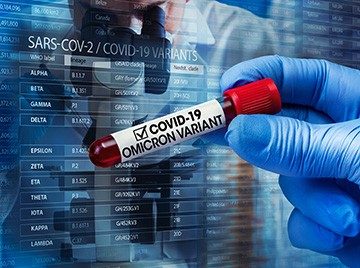FOR IMMEDIATE RELEASE
ACS News Service Weekly PressPac: February 16, 2022
Increased infectivity, antibody escape drive SARS-CoV-2 evolution, studies say
“Emerging Vaccine-Breakthrough SARS-CoV-2 Variants”
ACS Infectious Diseases
“Omicron Variant (B.1.1.529): Infectivity, Vaccine Breakthrough, and Antibody Resistance”
Journal of Chemical Information and Modeling
First announced by the World Health Organization on Nov. 26, 2021, the SARS-CoV-2 omicron variant spread rapidly around the world, becoming the dominant variant in the U.S. and elsewhere. Now, researchers report in ACS Infectious Diseases and the Journal of Chemical Information and Modeling that omicron and other variants are evolving increased infectivity and antibody escape, according to an artificial intelligence (AI) model. Therefore, new vaccines and antibody therapies are desperately needed, the researchers say.
Understanding how SARS-CoV-2 evolves is essential to predicting vaccine breakthrough and designing mutation-proof vaccines and monoclonal antibody treatments. In a recent study in ACS Infectious Diseases, Guo-Wei Wei and colleagues analyzed almost 1.5 million SARS-CoV-2 genome sequences taken from people with COVID-19. They identified 683 unique mutations in the receptor binding domain (RBD), the region of the SARS-CoV-2 spike protein that attaches to the human ACE2 receptor on the surface of human cells. Then, they used an AI model to predict how these mutations affect binding strength of the RBD to ACE2 and to 130 antibody structures, including several monoclonal antibodies used as therapies. The team found that mutations to strengthen infectivity are the driving force for viral evolution, whereas in highly vaccinated populations, mutations that allow the virus to escape vaccines become dominant. The researchers also predicted that certain combinations of mutations have a high likelihood of massive spread.
In another study in the Journal of Chemical Information and Modeling, Wei and colleagues took a deep dive into the omicron variant’s infectivity, vaccine breakthrough and antibody resistance. They used their AI model to analyze how the variant’s unusually high number of mutations on the spike protein affect RBD binding to ACE2 and antibodies. Their results indicated that omicron is over 10 times more infectious than the original coronavirus and 2.8 times more infectious than the delta variant. In addition, omicron is 14 times more likely than delta to escape current vaccines, and it is predicted to compromise the efficacy of several monoclonal antibody therapies. Many of these predictions have been verified by emerging experimental results, stressing the importance of developing a new generation of vaccines and monoclonal antibodies that won’t be easily affected by viral mutations, the researchers say.
The authors acknowledge funding from the National Institutes of Health, the National Science Foundation, NASA, the Michigan Economic Development Corporation, the Michigan State University Foundation, Bristol-Myers Squibb and Pfizer.
###
The American Chemical Society (ACS) is a nonprofit organization chartered by the U.S. Congress. ACS’ mission is to advance the broader chemistry enterprise and its practitioners for the benefit of Earth and all its people. The Society is a global leader in promoting excellence in science education and providing access to chemistry-related information and research through its multiple research solutions, peer-reviewed journals, scientific conferences, eBooks and weekly news periodical Chemical & Engineering News. ACS journals are among the most cited, most trusted and most read within the scientific literature; however, ACS itself does not conduct chemical research. As a leader in scientific information solutions, its CAS division partners with global innovators to accelerate breakthroughs by curating, connecting and analyzing the world’s scientific knowledge. ACS’ main offices are in Washington, D.C., and Columbus, Ohio.
To automatically receive press releases from the American Chemical Society, contact newsroom@acs.org.
Note: ACS does not conduct research, but publishes and publicizes peer-reviewed scientific studies.
Media Contact
ACS Newsroom
newsroom@acs.org


